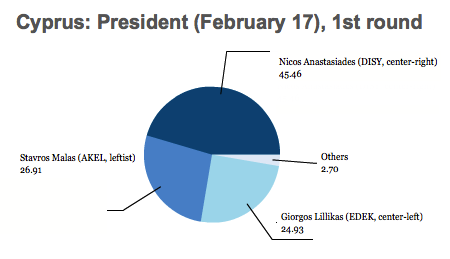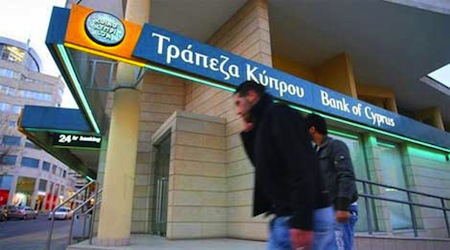Sunday kicks off the first of two days of presidential elections in three very different regions of the world.
Unlike throughout, say, much of parliamentary-based Europe, each of the presidents elected in the next 48 hours will wield significant power, as each functions both as a head of state and as a head of government.


Cyprus
The most contested of the three elections is in Cyprus, where Demetris Christofias is leaving office after a four-year term and where the European Union is set to push hard for bailout (or default) terms shortly following election season after previous talks have failed, due to Christofias’s refusal to privatize much of Cyprus’s public economy. The frontrunner to win Sunday’s vote is Nicos Anastasiades, candidate of the center-right Democratic Rally (DISY, Δημοκρατικός Συναγερμός or Dimokratikós Sinayermós), and many European leaders seem keen on his election, which would certainly accelerate reform and austerity in Cyprus.
But his lead comes in large part from a split among leftist voters, who are supporting both Stavros Malas, minister of health, the candidate of the governing Progressive Party of Working People (AKEL, Aνορθωτικό Κόμμα Εργαζόμενου Λαού or Anorthotikó Kómma Ergazómenou Laoú) and Giorgos Lillikas, another center-left candidate and former foreign minister.
Although Anastasiades will likely win the first round, he’s not likely to win the 50% support necessary to avoid a runoff, which will be held, if necessary, a week later on February 24 when either Malas or Lillikas would have a clear-cut shot at defeating Anastasiades.
A failure to contain the Cypriot financial contagion, which brings with it the politically unpopular move of bailing out Russian oligarchs who have funded and deposited money into Cyprus’s banks, could exacerbate the still-tenuous Greek bailout or even jumpstart anew the eurozone sovereign debt crisis, so the outcome is more important to Europe than you might expect for an island nation of 1.2 million.
Ecuador
Less suspenseful is the presidential election in South America, where incumbent Rafael Correa is a prohibitive favorite to a third term by one of the largest margins in recent Ecuadorian political history — and certainly since the end of military rule in 1979.
Correa, whose governing Movimiento Patria Altiva i Soberana or Alianza PAIS (Proud and Sovereign Fatherland, or ‘PAIS’) is also looking to retain control of the 137-seat, unicameral Asamblea Nacional (National Assembly), has benefitted from an oil-backed economic boom, the proceeds of which he’s spent on massive infrastructural improvements, especially roads, as well as for direct cash grants that have helped cut Ecuador’s poverty rate from around 67% to between 25% and 30%. In the tradition of the populist Latin American left, Correa defaulted on the country’s government bonds in 2008 and picked diplomatic fights with the United States. Critics charge that his administration has become increasingly authoritarian, and his government has made the climate for Ecuador’s media somewhat less free.
His opposition includes Álvaro Noboa, banana magnate and one of Ecuador’s wealthiest businessmen; Guillermo Lasso, a former head of the Banco de Guayaquil; Lucio Gutiérrez, a former president who left office in 2005 after massive protests; and Alberto Acosta, Correa’s former oil and mining minister and co-founder of the Alianza PAIS.
None of those opponents has broken through, however, and Correa holds a lead well above 50% in most polls, meaning that he’s likely to win reelection without resorting to an April 7 runoff.
Armenia
Finally, in the South Caucasus, Armenian president Serzh Sargsyan (Սերժ Սարգսյան) is seeking reelection after taking office in 2008.
Despite a high-profile assassination attempt against opponent Paruyr Hayrikyan (Պարոյր Հայրիկեան) two weeks ago, Sargsyan is almost certain to win reelection — he faces only minor opposition, given that former president Levon Ter-Petrosyan (Լևոն Տեր-Պետրոսյան) ruled out a presidential bid, as did wealthy oligarch Gagik Tsarukian (Գագիկ Ծառուկյան), the leader of the largest Armenian opposition party, Prosperous Armenia (BHK, Բարգավաճ Հայաստան Կուսակցություն).
Sargsyan’s party, the Republican Party of Armenia (HHK, Հայաստանի Հանրապետական Կուսակցություն), currently holds control of the Armenian National Assembly after last year’s May parliamentary elections, and has held power since the election of Sargsyan’s predecessor and benefactor, Robert Kocharyan (Ռոբերտ Քոչարյան) in 1998.
After the election, Armenia’s president will face an economy that’s still recovering from recession and slow growth, balancing good relations with both Europe and the United States, on one hand, and Russia, on the other hand, the 100th anniversary of the Armenian genocide and dicey diplomatic relations with Turkey, and three decades of ongoing hostility with neighboring Azerbaijan, largely due to the unsettled status of the breakaway region of disputed region of Nagorno-Karabakh, over which Azerbaijan and Armenia went to war from 1988 to 1994.
![]()



